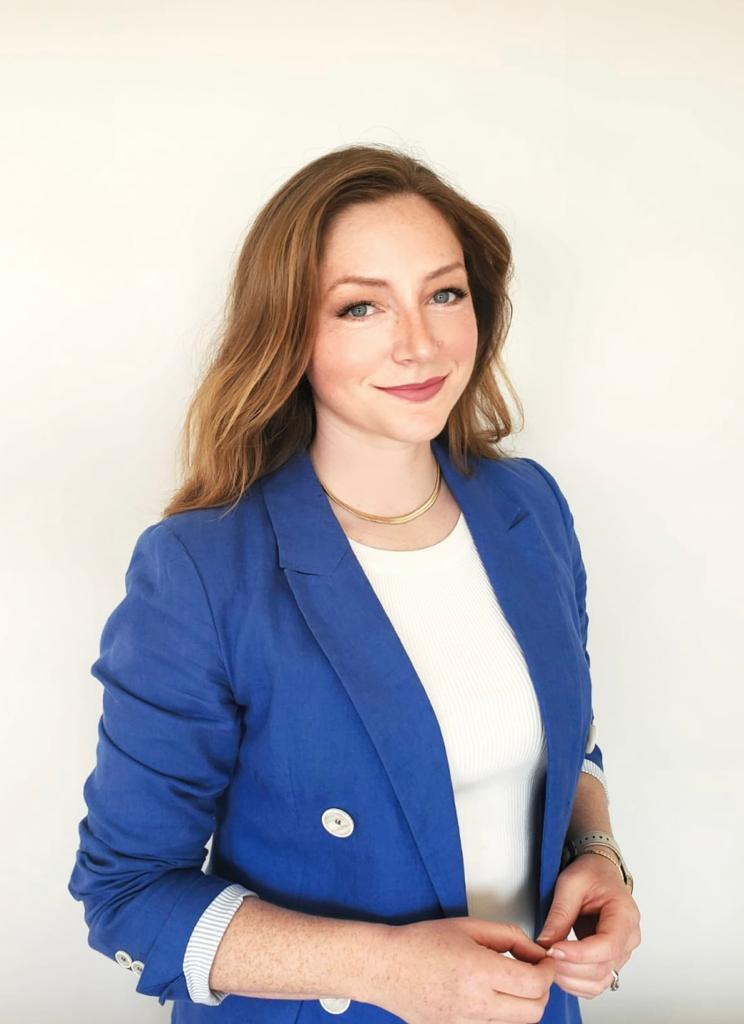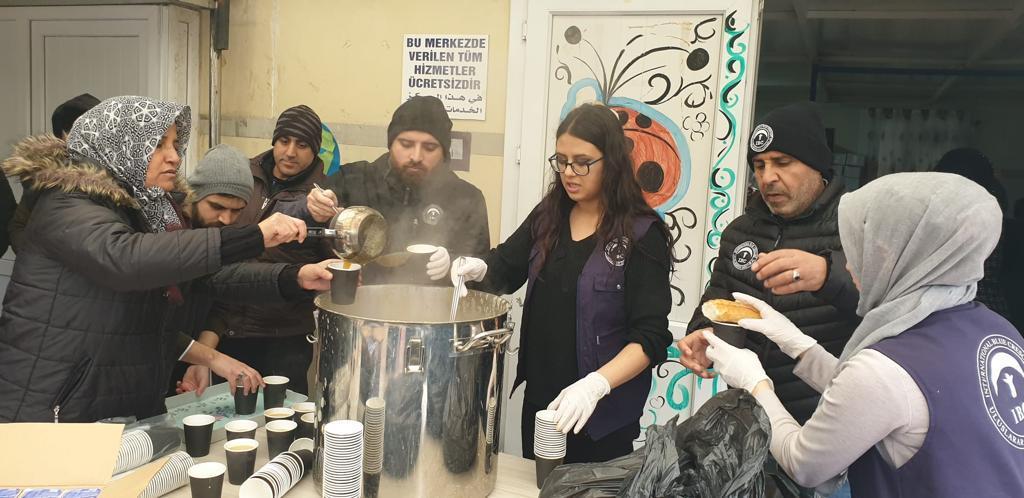Üner had been on the job for nine months in the country when devastating earthquakes hit southeastern Türkiye in early February. A month later, she recounts the resilience of survivors, the tenacity of aid workers, and how the Elliott School prepared her for this extreme challenge. We celebrate her and her efforts during this Women’s History Month.
GW: Tell us about what you are doing now and your experience in the earthquake zone.
HSU: Earthquakes are terrifying. They remind us how powerful nature is, how small we are, how much we have to lose. They remind us that we are all the same, really, when we are running for our lives. The earthquakes that struck southeastern Türkiye on February 6 were stunning in their devastation, their power, and their quick succession, one after another. I work at International Blue Crescent (IBC), a Turkish international NGO with offices already established in the earthquake region, so we mobilized immediately after the first 7.8-magnitude earthquake struck at 4:17 am. Field staff opened our doors in the pre-dawn dark to offer shelter, warm blankets and hot cups of soup to survivors. Headquarters staff, like me, began to establish a strategic response to the disaster based on information coming in and the availability of aid on hand. Then, after a series of aftershocks, another powerful earthquake hit, measuring 7.5-magnitude at 1:24 pm, causing many of the buildings still standing to crumble and fall. We sent out more urgent appeals to our partners and collaborated with local and state actors to establish channels of aid. The work didn’t end. We worked all day and all night, and we are still working because a disaster of this size means that no organization and no state can respond alone. The devastation is simply too vast.
In the first days, I fielded calls from survivors who could hear the voices of their loved ones crying out from beneath the rubble. The roads were impassable with debris and icy weather hindered rescue efforts. The survivors called because doing something is better than nothing, even when there is no hope. I also fielded calls from hundreds of donors from around the world who overwhelmed me with empathy, kindness, and true acts of solidarity. They called because even when there is despair, there is hope.
Since the earthquakes, the needs of the survivors have changed rapidly, and so too has our work. An urgent need for blankets and hot food has given way to a need for shelter and WASH [water, sanitation and hygiene] infrastructure as new fears of disease and water-borne illness surface – particularly in northern Syria where an already vulnerable population is now living in over-crowded reception centers with limited access to clean water, latrines, and healthcare. In Türkiye, as millions of people evacuate the earthquake zone and resettle in camps, new questions of education, employment, and healthcare arise alongside the challenges of providing for the basic needs of the earthquake victims.
At IBC, I am the Programs Development Coordinator and the Izmir Regional Coordinator, which means I spend some of my time in the office and some of my time in the field. In Izmir, I manage the nutritional needs of 1000 earthquake evacuees housed in a military camp. The psychological toll on the survivors cannot be underestimated. Every day new needs develop, meaning our programming must be agile and responsive, further underscoring the need for flexible funding. There is so much work to be done.
I am grateful to be a part of the OCHA [UN Office for the Coordination of Humanitarian Affairs] working groups and the Northwest Syria NGO Forum, where I represent IBC in the MEAL [monitoring, evaluation, accountability, and learning] working group, a section very underrepresented by female colleagues. Collaborating with other qualified NGO workers to develop standardized practices and protocol in a coordinated effort allows us to collect better data and therefore make better decisions in our programmed responses. Finally, I am deeply appreciative of my colleagues at IBC and proud of our support for one another during this time of tribulation and sorrow, testifying to the power of teamwork and the tenacity of humanitarian workers.
GW: What drew you to GW and the Elliott School for your graduate studies? How did GW influence your professional choices and successes?
HSU: I chose the Elliott School because of its impeccable, widespread reputation. The robust educational programming and high-caliber academic staff challenged me to stretch my thinking and attain a higher level of academic and professional excellence. I came to the International Development Studies program with a background in cultural anthropology, which gave me quite a lot of insight but not many tools to address the challenges I encountered in the field. The Elliott School gave me the pragmatic skills necessary to create change, making me more versatile and effective as a practitioner. I attribute much of my success to the lessons I learned during my graduate studies, which differentiate me from a lot of other NGO workers and at many times, has flattened the learning curve at work. Besides this, studying in the heart of DC was another advantage in itself as I was able to attend countless seminars and enriching presentations from some of the world’s best thinkers, exposing me to a multitude of different perspectives. Of course, I must mention my fellow students, buzzing with ideas and blooming with potential, who have since become valued contacts in my professional network.
GW: Are there particular classes and professors who stand out in your mind?
HSU: While I loved all my classes at GW, I especially enjoyed classes on culture, leadership, and bottom-up development. However, the classes that were more challenging for me are the ones I seem to revisit most often in my professional work, especially statistics. When designing programs or in my role as the MEAL representative, I am thankful to have learned these hard skills. I look fondly back on my time at the Elliott School and would like to thank Professor Sean Roberts, who was encouraging of me during my studies, motivating me to work hard and experiment with new ideas. Professor Aisling Swaine opened new windows in my mind, forever changing the way I view the world and myself. Above all, the capstone project was an invaluable chance to embrace a true experiential learning opportunity. I am grateful for the sage leadership of Professor Christina Fink, who graciously, patiently guided our capstone group along the way. To all my professors, thank you.
GW: What would you say to current GW students who want to make a positive difference in the world?
HSU: To the current GW students who want to make a difference in the world, especially international development studies students, I encourage you to apply the same principles of development work to your professional life. Value and perpetuate transparency, accountability, and rights-based moralities in your own work. Make room for women. Make room for minorities. Mentor and support rising new stars in the field. Share resources, be open to collaboration, and give credit to those who help you along the way. Be strong, be true to yourself.
Don’t underestimate the importance of soft skills and look for points of connection between ideas, sectors, and people. Challenge yourself to learn new languages and experience different cultures because making connections is crucial to our work as advocates of humanity. The undeniable interconnectedness of humankind is our strength and the key to lasting hope.



